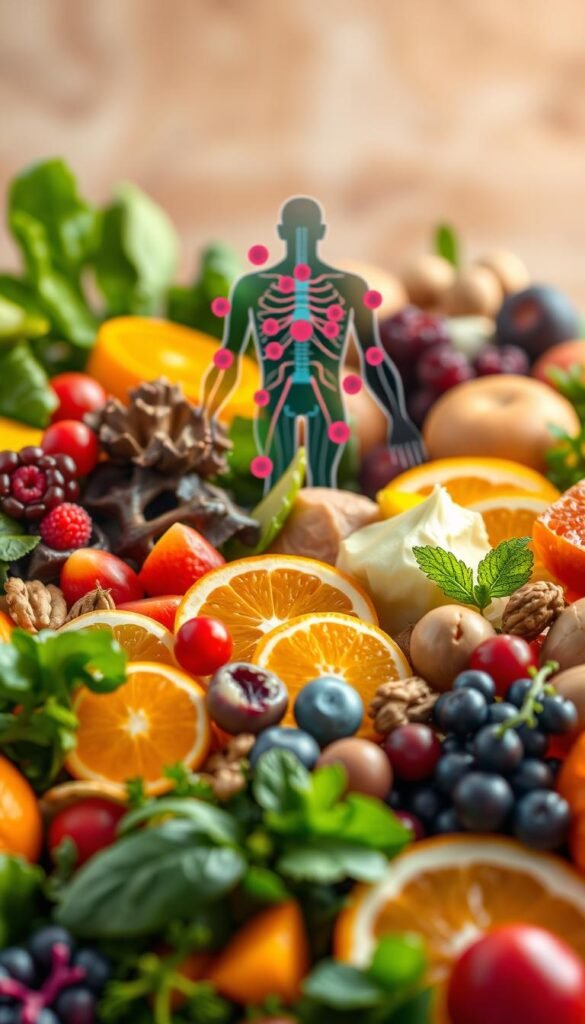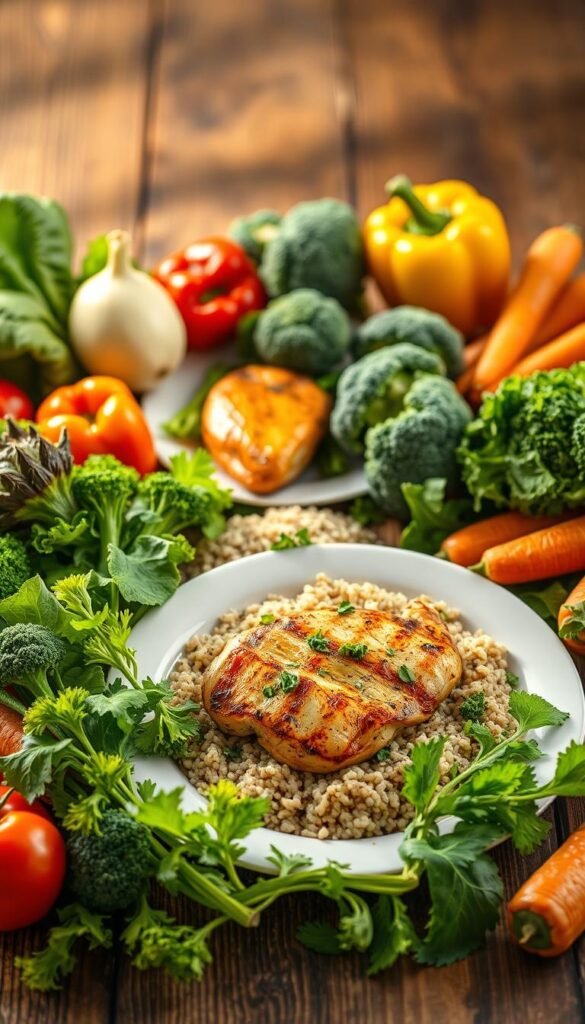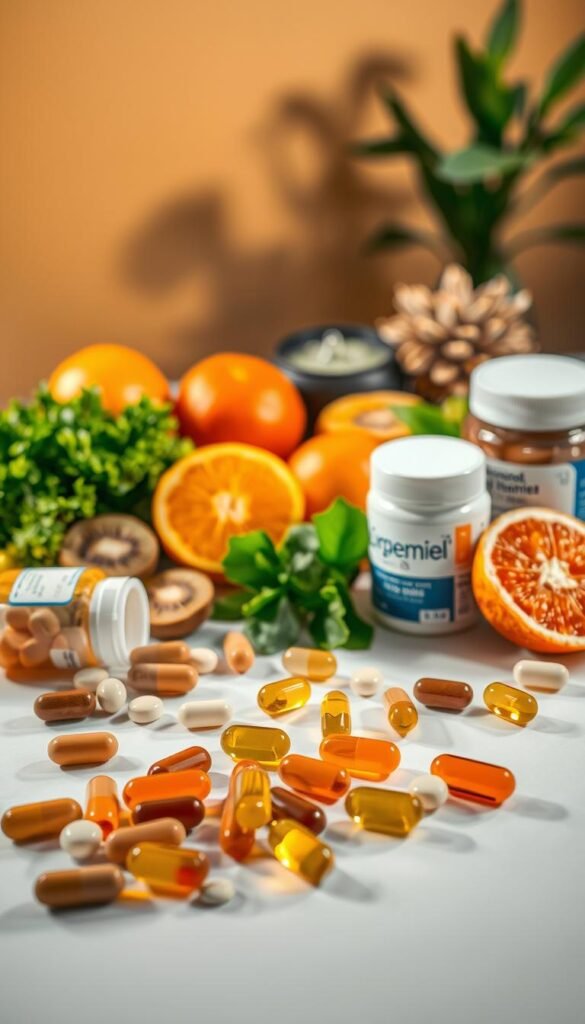Best Foods for COVID Recovery
Did you know your plate could be your most powerful ally when battling COVID-19? Research reveals individuals with balanced diets are 30% less likely to develop severe symptoms compared to those with poor eating habits. What you consume doesn’t just fuel your day—it directly shapes your immune system’s ability to combat viruses and repair tissues.
Fresh produce, whole grains, and lean proteins provide critical vitamins and minerals your body craves during illness. For example, zinc from nuts and seeds helps shorten infection duration, while vitamin C-rich fruits reduce inflammation. The Australian Guide to Healthy Eating recommends daily servings of colorful vegetables and quality proteins to maintain defenses against infections.
Your metabolic needs spike when sick, demanding nutrient-dense meals to sustain energy and healing. Skipping key food groups can slow progress, but strategic eating supports faster symptom relief and lowers complication risks. Think of every meal as a chance to rebuild strength cell by cell.
Key Takeaways
- Balanced diets correlate with milder COVID symptoms and quicker healing times
- Zinc, vitamin C, and protein-rich options boost immune responses
- Metabolic demands increase during illness, requiring targeted nutrition
- Colorful fruits/vegetables provide antioxidants for tissue repair
- Poor eating habits may prolong recovery or worsen outcomes
Introduction: The Role of Nutrition in Your COVID Recovery
When your body battles an infection, every bite counts. Eating well during illness isn’t just about comfort—it’s about giving your cells the tools they need to fight back. Your meals become raw materials for antibodies, energy for fever management, and repair kits for damaged tissues.

Why a Healthy Diet Matters When You’re Sick
Your immune system burns through energy faster than a car on a highway during sickness. Studies show infection-fighting cells multiply rapidly, demanding extra protein and vitamins. Without proper fuel, your defenses weaken like a phone losing battery.
Think of your gut as mission control—70% of immunity lives there. What you eat directly affects this command center. Whole grains feed good bacteria, while colorful veggies supply antioxidants that calm inflammation.
How Nutrients Strengthen Your Immune Response
Zinc from pumpkin seeds acts like a shield, blocking viruses from replicating. Vitamin C in strawberries helps white blood cells attack invaders. These nutrients work together like a well-trained sports team.
Protein rebuilds muscle after days in bed, while healthy fats from fish reduce lung inflammation. Even water plays a role—staying hydrated thins mucus and flushes toxins. Your plate becomes medicine, healing you from the inside out.
Explore best foods for covid recovery for Optimal Healing
What if your knife and fork could speed up healing? Smart choices deliver the building blocks your body desperately needs post-illness. Focus on two pillars: muscle-supporting proteins and vibrant plant allies that work like microscopic repair crews.

Rebuild With Smart Fuel Sources
Your muscles aren’t just sore—they’re hungry. Chicken, lentils, and Greek yogurt supply amino acids that patch up tissues damaged by inflammation. Spread protein intake across meals to avoid energy crashes. One study found spaced-out consumption preserves 23% more muscle mass during recovery.
Don’t forget the rainbow on your plate. Spinach packs magnesium to calm frazzled nerves, while orange bell peppers deliver a day’s vitamin C in one serving. These colorful allies fight oxidative stress better than any supplement bottle.
Liquids Are Your Secret Weapon
Dehydration thickens mucus and slows detox pathways. Sip warm bone broth—it’s like a multivitamin in a mug, offering both electrolytes and collagen. Herbal teas with ginger or mint ease scratchy throats while keeping fluid levels topped up.
Craving something crunchy? Reach for cucumber slices or celery sticks. Their high water content counts toward your daily two-liter goal. Pair them with hummus for a mineral boost—zinc and iron team up to recharge red blood cells.
Nutrient Spotlight: Vitamins, Minerals, and Healthy Fats
Your body runs on biochemical fuel that determines how well it fights invaders. Three nutritional heavyweights stand out for their immune-boosting power—vitamin D, zinc, and omega-3s work like specialized repair crews during recovery.

Vitamin D, A, and Zinc: Building Blocks for Your Immunity
Vitamin D acts like a security guard at your cell doors. Research shows it blocks viruses from latching onto lung tissues by interacting with ACE2 receptors. Just one salmon fillet delivers over 100% of your daily needs—pair it with egg yolks or fortified orange juice for extra defense.
Vitamin A tackles oxidative stress like a fire extinguisher. Sweet potatoes and spinach provide this antioxidant warrior that calms inflammation. Meanwhile, zinc from pumpkin seeds and cashews keeps your immune system alert—low levels leave you vulnerable to prolonged symptoms.
Omega-3 Fatty Acids and Their Role in Reducing Inflammation
Think of omega-3s as peacekeepers in your bloodstream. Fatty fish like sardines contain EPA and DHA that may prevent dangerous cytokine storms. Studies suggest these fats cool down inflammation better than most supplements.
Walnuts and chia seeds offer plant-based options. Their anti-inflammatory effects create ideal conditions for healing while supporting brain health. Evidence shows adequate omega-3 intake may help ease the anxiety that often shadows illness.
Delicious Recipes and Meal Ideas to Bolster Your Recovery
Your kitchen becomes a healing lab when recovering from illness. Simple, nourishing meals can accelerate your bounce-back while soothing frazzled nerves. Let’s explore flavor-packed options that do double duty as medicine.
Wholesome Chicken Soup and Comforting Broths
Grandma’s favorite remedy gets a science-backed upgrade. Simmering bones releases collagen that repairs gut lining, while carrots and celery deliver vitamin A and potassium. This liquid gold contains 17 amino acids your immune system uses like building blocks.
Try this hack: Add garlic and turmeric for extra anti-inflammatory power. Slow-cooked versions break down nutrients for easier absorption when your energy’s low. Freeze single portions for grab-and-go healing.
Mediterranean Diet-Inspired Meals and Smoothies
Channel sunny coastal eating habits with olive oil-roasted veggies and grilled fish. These meals pack antioxidants that calm inflammation like a lullaby for your cells. Pair whole grains with leafy greens for sustained energy without sugar crashes.
Blend spinach, frozen berries, and Greek yogurt for a 60-second nutrient bomb. Add chia seeds for omega-3s that support lung health. Need crunch? Dip apple slices in almond butter—it’s like dessert that fights fatigue.
- Batch-cook soups and grain bowls during energy peaks
- Swap sugary drinks for herbal teas or infused water
- Use frozen fruit to reduce prep time
Diet Planning Tips for Managing Long COVID Symptoms
Navigating lingering symptoms requires smarter fuel strategies than your initial recovery phase. Your body now faces a different battle—one where sustained energy and gut support become non-negotiable allies.
Calculating Your Caloric Needs During Recovery
Breathlessness and inflammation burn through calories like a campfire. Many people need 800+ extra daily calories just to meet basic demands—equivalent to adding three large bananas to your intake. Use an online TDEE calculator, then boost your baseline by 10-15%.
Struggling to eat enough? Try six smaller meals instead of three. Keep trail mix by your bed for midnight snacks. Smoothies with nut butter and oats slip in calories without chewing fatigue.
Fiber-Rich Foods and Gut Health Strategies
Your gut lining acts as headquarters for 70% of your immunity. Lentils and quinoa feed beneficial bacteria that regulate inflammation—critical since COVID targets blood vessels. Sweet potatoes deliver double-duty fiber and potassium for vascular support.
Changed taste or smell? Marinate proteins in citrus or herbs to enhance flavor. Roast veggies until caramelized for easier digestion. If supplements become necessary, pair them with meals for better absorption.
- Track symptoms alongside meals to identify energy patterns
- Batch-cook fiber-packed stews during high-energy days
- Consult a dietitian for personalized micronutrient testing
Conclusion
Your plate holds more power than you realize in healing journeys. Choosing nutrient-packed meals fuels your immune system while calming inflammation—key allies when rebuilding strength. Colorful produce, quality proteins, and smart hydration work like microscopic repair kits for your body.
Remember: eating well pairs with rest and medical care for full recovery. While some suggest restrictive diets, research confirms balanced vitamins minerals intake matters most. Think of each meal as armor against lingering infection symptoms.
Protecting your health extends beyond the kitchen. Vaccines, sleep, and stress management form a safety net with nutrition. Small, consistent choices—like swapping sugary snacks for nuts or berries—build resilience against future challenges.
Your body heals at its own pace. Trust the process while giving it premium fuel. Every sip of broth or bite of salmon writes a new chapter in your recovery story—one where smart eating supports lifelong vitality.

